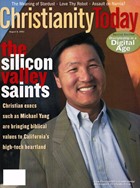James Edwards: A Unity Not of Our Making
 James R. Edwards, “A Unity Not of Our Making” Christianity Today (Vol 45, No 10, August 6, 2001), pp. 48-50.
James R. Edwards, “A Unity Not of Our Making” Christianity Today (Vol 45, No 10, August 6, 2001), pp. 48-50.
“Unity in Diversity” has become one of the most popular ecumenical catchphrases. Especially among Pentecostal churches, the phrase seems to open up ways to engage in ecumenical dialogue without threatening the ecclesial independence or doctrinal commitment of the churches. James R. Edwards, Professor of Religion at Whitworth College and contributing editor to Christianity Today, has chosen to examine the phrase more closely. He is concerned about a nearly obsessive reliance on unity-in-diversity language and sees in it, rather than the desired emphasis on unity, a frequent apology for an unquestioned pluralism in Christian churches. Like light shining through a prism, the visible unity of the churches, instead of forming one body, is dispersed into many independent directions. The New Testament, however, Edwards points out, speaks of diversity that is channeled into unity and not, as the ecumenical catchphrase suggests, a unity that is being refracted into diversity. For support, he enlists the help of the Greek New Testament term homothumadon (“of one accord”).
Edwards finds that the use of homothumadon is frequently misunderstood. In secular Greek, the term does not convey the personal sympathy shared by the members of a group but a shared commitment of all to a specific cause. Thus the Greek orator Demosthenes “appealed to the Athenians to put aside their personal feelings and differences” (p. 49) and to unite in the defense against an invasion of Philip of Macedon. Edwards concludes that, like the unity of the Athenians, the unity of the church is “a compulsory unity rather than an intrinsic unity” (p. 49), produced by the extrinsic, and unmerited grace of God. The unity of believers is consequently not a sociological unity but one in correspondence and continuity with the proper understanding of God’s Word. This explains the use of the phrase “in one accord” in Acts 15:25 for an ecclesial situation that seems far from resembling a united Christian community. In order to achieve unity, the church must submit to the extrinsic Word of God, which is the great alien intolerance of human differences and divisions (John 17:11-22). The unity-in-diversity language, on the other hand, gives the impression that unity is based on the self-righteousness of the churches or their adaptability to changing social and theological norms. The true unity of the church, however, is “an alien gift of God from the outside, reflecting both God’s nature and governance” (p. 50). The goal of the church, Edward concludes, is not diversity but unity with God. It is a gift of God’s Spirit as long as the church follows God’s will as it is revealed in Scripture.
Category: Ministry, Winter 2002


